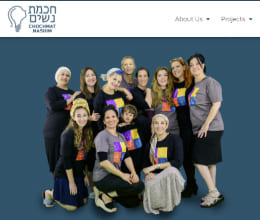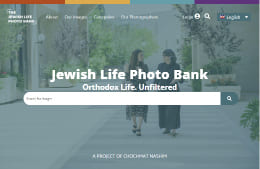The news spread quickly around social media. Ashkenazi Chief Rabbi Lau ordered that a woman not be buried until her son agreed to provide a get to the woman he held chained in marriage for over ten years.
Details came in dribs and drabs while shocked people debated the move.
Some cheered Rav Lau’s decision. Others derided it. For some, it showed empathy for the woman chained and a tough stance on get refusers. To others, it showed the incompetence of a system that leaves Jewish women at their husband’s mercy and the refusal of those in power to make systemic change.
In this case, a man was refusing to divorce his first wife, even while he had remarried after attaining a document signed by 100 different rabbis – known as a heter meah rabanim – permitting him to marry a second wife. His wife of course has no such option.
His action went directly against the directives of the Agudas Harabonim in the US, which applied punitive measures against the husband several years ago to pressure him to divorce his wife. It was they who contacted the Chief Rabbi and asked him to refuse the woman burial unless her son acquiesced to give the get.
Threads on Facebook went back and forth as people awaited news.
I think it’s awful. But if that’s the only way to get him to give the get, then so be it. And good for the Beit Din for thinking of this as a possible solution – it’s certainly not what I would have expected.
This is a political stand, demonstrating sympathy with a cause, rather than doing anything substantial to advance the cause. When the rabbanut declares divorce judicially by “forcing his hand,” let me know. Until then, it’s all blah-blah.
The truth is that they are both right. It was at once a bold move and far too little.
While it’s horrible to have come to this, Rav Lau did right by refusing the mother’s burial (especially as it seems that she had supported her son in his refusal) not only because as one commenter wrote, “the dignity of a living woman is more urgent than that of one who has died,” but because the man had succeeded in using the system to his advantage. He had moved on and had nothing left to lose.
Rav Lau took the opportunity presented to him and did what he could.
I should note that I have personal gratitude to Rav Lau. It is he who finally ended my aunt’s suffering when nearly everyone else left her to her fate, first as an agunah and then as divorced but unable to prove it when the Jerusalem Beit Din wrote the get but refused to send the certificate of divorce for three years. It was he who stood up to those with interest to keep her chained and I will forever be grateful to him for that.
That said, the man in today’s story did not give a get while he was here in Israel for the burial. It is entirely possible that he won’t when he returns. A man who can violate Torah, refuse to listen to the rabbinic court, and marry a second wife while still chaining the first can hardly be expected to keep a promise, even if it is backed by monetary punishment.
The story of a woman chained in marriage is not a new one. Many claim the halachic prenuptial agreement is the cure. I can’t yet agree. Nonetheless, it is by far, the best thing we have and without a doubt prevents many women and men from being trapped in marriage.
Most are designed to bring about an agreement before arriving in Beit Din and are thus highly effective. Some are better than others. Everyone should sign one.
Listen to this Chochmat Nashim podcast for a fuller discussion on prenups, but suffice it to say that many great rabbanim, including Rav Ovadia Yosef, zt’l approved of a prenup and the mechanism used within them to disincentivize the withholding of a get.
Unfortunately, in their current form, most prenups do not protect against all circumstances. Beyond that, those that do are not universally accepted. The rabbis that reject prenups and dissuade couples from signing them, leave us with a system where different religious courts make different rulings. A young couple simply seeking to start a life together and protect one another from their worst selves, does not know how best to do that.
Recently, even Rav Lau came out against halachic prenuptial agreements. At a conference, he said:
Regarding the prenuptial agreements… In the past we formed a committee and examined the agreements to find one that doesn’t compromise halacha. We did not succeed in finding one…Those who come to the court with an agreement added fuel to the fire.”
When I spoke with Rav Lau a number of weeks ago to ask him about his stance, he explained that in cases where people tried to use the agreement as evidence in a Beit Din deliberation, he hasn’t seen them help. He claimed that previous agreements created difficulties and acrimony, and for some judges, ruined the validity of the get they wanted to arrange.
When I mentioned the many rabbanim who wrote and supported prenups, Rav Lau said there is no single version acceptable to all, thus he cannot in good faith support them.
My voice broke when I told him that as a Jewish mother, I feared the chuppah for my daughters, that I felt it was my responsibility to protect them from the harm that could come to them via Jewish marriage.
It was then that the conversation changed from one of an activist asking a leader for change, to a Rav having compassion to a supplicant. He asked me what I would do in his shoes. This was my response and this is my response to every rabbi and communal leader, teacher, and person of influence in the Jewish community:
“This is why you are in the position you are in. For many of us, women chained and trapped in Jewish marriage is THE halachic issue of our time. It is what we are responsible to solve in order to save the dignity of Jewish women and Jewish marriage. If you don’t like the options that exist, put yourself in a room with other knowledgeable people, decide on a solution — and implement it. When Jewish mothers fear the chuppah for their daughters, when Jewish marriage has become a trap for Jewish women, it is your responsibility to fix what has been broken.”
It can’t take preventing a mother’s burial to unchain the women awaiting their freedom.


